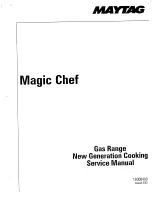
24 English
C
ookt
op c
ooking
Cooktop cooking
Choosing the proper cookware
What your cookware is made of determines how evenly and quickly heat is
transferred from the surface element to the pan bottom.
•
ALUMINUM
- Excellent heat conductor. Some types of food will cause the
aluminum to darken. (Anodized aluminum cookware resists staining & pitting.).
If aluminum pans are slid across the ceramic cooktop, they may leave metal
marks that resemble scratches. Remove these marks as soon as the cooktop
cools down.
•
COPPER
- Excellent heat conductor but discolors easily. May leave metal
marks on ceramic glass (see above).
•
STAINLESS STEEL
- Slow heat conductor with uneven cooking results. Is
durable, easy to clean and resists staining.
•
CAST IRON
- A poor conductor; retains heat very well. Cooks evenly once
cooking temperature is reached. Not recommended for use on ceramic
cooktops.
•
ENAMELWARE
- Heating characteristics will vary depending on the base
material. Porcelain enamel coating must be smooth to avoid scratching
ceramic cooktops.
•
GLASS
- Slow heat conductor. Not recommended for ceramic cooktop surfaces
because it may scratch the glass.
Using the proper cookware
Using the right cookware can prevent many problems, such as uneven cooking or
extended cooking times. Using the proper pans will reduce cooking times and cook
food more evenly.
Check for flatness by rotating a ruler across
the bottom of the cookware.
CORRECT
INCORRECT
Flat bottom and straight sides.
•
Tight fitting lids.
•
Weight of handle does not tilt
pan.
•
Pan is well balanced.
•
Pan size matches the amount of
food to be prepared and the size
of the surface element.
•
Made of a material that
conducts heat well.
Always match pot diameter to
element surface diameter.
Curved and warped pan bottoms.
Pan overhangs element by more
than one-half inch.
Pan is smaller than element.
Heavy handle tilts pan.
















































